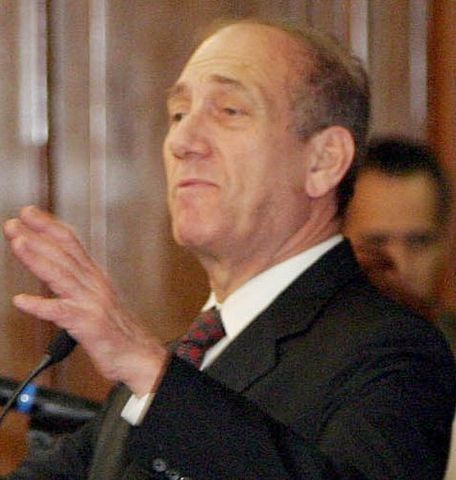During his term as Prime Minister of Israel, Ehud Olmert hoped to make history by brokering a historic deal with Palestinian President Mahmoud Abbas to end the Israeli-Palestinian conflict. Nearly a decade later, he succeeded in making history, albeit for a different reason.
Last week, on Monday, February 15th, Olmert arrived at Maasiyahu prison in Ramle to begin serving his 19-month sentence. He is the first Israeli prime minister to serve time in prison. The ex-premier has been convicted of taking bribes to expedite the construction of a large housing compound in Jerusalem called Holyland, while he was mayor of the city. While his original sentence had been six years, the Israeli Supreme Court overturned his main conviction and reduced the sentence.
Olmert’s punishment is described by fellow high-level politicians as a shameful event, but simultaneously as proof of the strength of Israel’s democracy. “This is the legal process which is custom in democratic states,” said former President of Israel, Shimon Peres. “Personally, this is a sad day. But the legal process was untouched by personal interests,” he concluded. His comments were echoed by former Finance Minister, Yair Lapid, Opposition Chairman, Isaac Herzog, former Justice Minister, Tzipi Livni and former Internal Security Minister, Yitzhak Aharonovich.
Indeed, Olmert’s imprisonment is a sign of the fairness and democracy of Israel, especially when compared to some of its neighbors. Even Olmert himself, in a video released shortly before the start of his imprisonment, said, “I accept the sentence with a very heavy heart. Nobody stands above the law.” This is in contrast to many leaders in Arab countries surrounding Israel who are notorious for financial and other sorts of corruption, but are never penalized for it. Former Palestinian President and arch-terrorist, Yasser Arafat, for example, was infamous for directing billions in public funds to his personal bank accounts, yet he was never penalized. In contrast, Israel is ranked 32 out of 167 countries in lack of internal corruption according to the Corruption Perception Index, which ranks countries “by their perceived levels of corruption, as determined by expert assessments and opinion surveys.” Israel’s neighbors Jordan, Egypt, Syria and Lebanon rank 45th, 88th,154th and 123rd, respectively. There is no question that compared to its neighbors, Israel only suffers from minimal corruption.
Unfortunately, Olmert is not the only high-ranking Israeli official serving jail time in recent history. One of the most broadcasted and most extreme examples of Israeli leaders getting in trouble with the law was the conviction of former President Moshe Katsav, who was convicted on two accounts of rape in 2011 and sentenced to serve seven years in prison. (He is in the same prison as Olmert and has offered to “mentor” him.) In 1997, Interior Minister Aryeh Deri was sentenced two years in prison for accepting $155,000 in bribes. He returned to politics in 2012 and is once again the head of the Shas party. While Israel ranks in the top 5th of the Corruption Perception Index, it doesn’t fair as well compared to other OECD countries, where it ranks 22 out of 23.
Israel, as the world’s only Jewish state, needs to lead the world in matters of morals and ethics. While Israel does display unprecedented morality in many areas, such as the rigorous efforts of the IDF in preventing civilian deaths, the levels of corruption seen in its politics are a stain on the fabric of Israeli society. A recent poll found that 72% of Israelis feel that their country suffers from widespread corruption. These statistics constitute a Chillul Hashem (Desecration of God’s Name) and efforts must be taken to cleanse the Israeli political world from this shameful trend.

